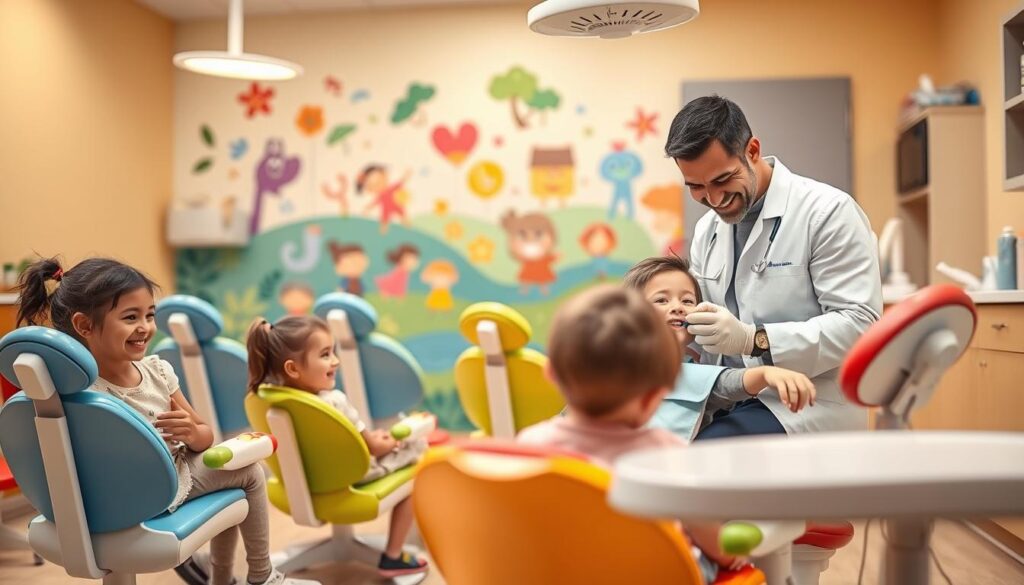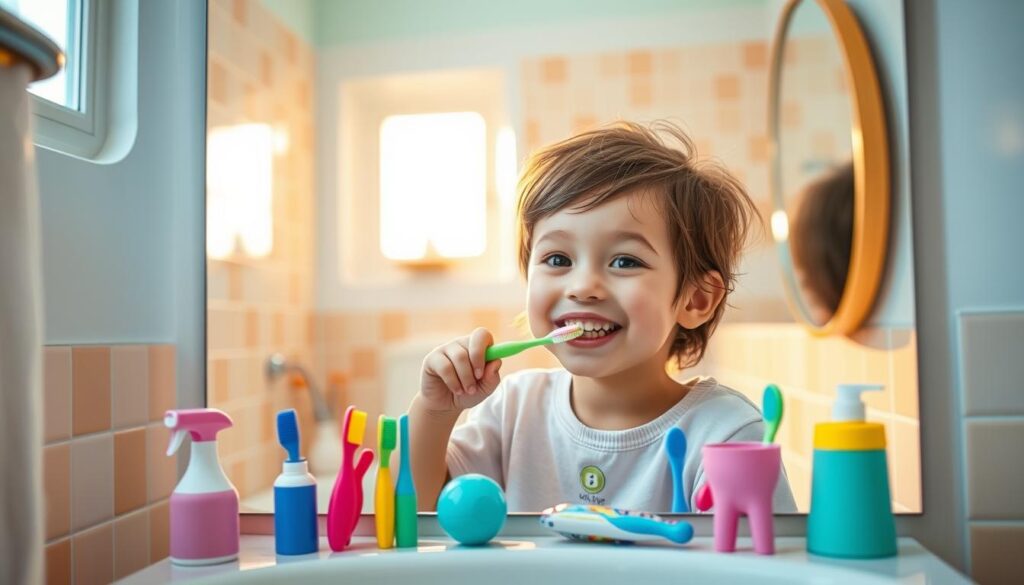How Often Should Children Have Dental Check-Ups?

Could missing those regular dental visits lead to serious problems later? Many families wonder, “How often should children have dental check-ups?” In the United States, experts say kids should go every six months. This helps catch tooth decay early and teaches parents how to keep teeth clean.
These regular visits help kids develop good habits. They learn the value of brushing and flossing. Plus, they get used to dental visits, which is key for a healthy smile all their lives. For more on dental care, check out this useful guide.
Key Takeaways
- Biannual dental visits detect early decay and guard against bigger problems.
- Starting around the first birthday helps form lifelong care routines.
- Comfort at the dentist grows with regular, stress-free visits.
- Parental involvement fosters healthy oral hygiene practices.
- Ongoing check-ups contribute to strong, confident smiles.
Understanding Children’s Dental Health
Starting early is key to a healthy smile for life. Teaching kids to brush and floss daily boosts their confidence. It shows a long-term commitment to their oral health.

Importance of Oral Hygiene
Good oral hygiene is essential for a healthy smile. Parents teach kids how to brush and floss right. They also choose the right toothpaste with fluoride.
This keeps the mouth clean and prevents cavities. It helps protect the teeth from damage.
Consequences of Neglecting Dental Care
Missing dental check-ups can harm a child’s health. Untreated cavities can cause pain and even tooth loss. This can make eating hard for kids and families.
By focusing on kids’ dental care, we can avoid big problems. It helps keep them comfortable and healthy.
| Key Steps | Benefits |
|---|---|
| Daily Brushing and Flossing | Removes plaque, lowers risks of decay |
| Routine Check-Ups | Identifies early issues, minimizes treatment |
| Fluoride Use | Strengthens enamel, safeguards vulnerable teeth |
| Balanced Diet | Supports gum health, reduces sugar intake |
Recommended Age for First Dental Visit
Finding the perfect time for a child’s first dental visit is key. Early dental checks help build good habits. These habits are essential for a lifetime of healthy teeth.
When to Schedule the Initial Check-Up
Experts say to book a dental visit when a child’s first tooth comes in. Regular visits prevent issues like baby bottle tooth decay. They also teach the right way to brush teeth.
This usually happens before a child turns one. It helps catch any growth problems early.
Role of Pediatric Dentists
Pediatric dentists get special training. They learn about sedation, early tooth growth, and how to handle kids. They check how teeth are spaced and help with home care.
They watch how teeth and jaws grow. This ensures they develop properly. It shows why ongoing dental care is so important for kids.
Frequency of Dental Check-Ups
Regular dental visits help catch problems early. Most kids need to go every six months. But, some might need to go more often.
Those with tooth decay or gum issues might need to see the dentist more. Early treatment can prevent bigger problems later. It also helps kids develop good oral hygiene habits.

General Guidelines for Children
Experts say kids should see the dentist at least twice a year. These visits help prevent cavities and check for gum problems. They are key to keeping teeth healthy for life.
For more information, check out this resource.
Factors Influencing Visit Frequency
Some kids need to go to the dentist more often. This includes:
- Frequent cavities or tooth sensitivity
- Health complications affecting oral development
- Brace adjustments or specialized orthodontic care
Keeping up with dental visits can prevent unexpected problems. It helps kids grow with healthy teeth and gums.
“Consistent check-ups allow clinicians to identify subtle changes before complications arise.” — American Dental Association
Infants and Toddlers: Dental Care Essentials
Early dental visits are key for kids’ health. Cleaning their teeth gently helps keep them safe. Regular check-ups help find any dental issues early.
Even the youngest kids need professional advice. They get plans for taking care of their teeth.
First Teeth: What to Expect
Teeth start coming in around six months. You might see some discomfort or drooling. Swollen gums are normal, but teething rings can help.
Pediatric dentists check these new teeth. They look for any problems that could affect future teeth.
Home Care Tips for Young Children
Here are some daily oral care tips for families:
- Use a soft-bristled brush or clean gauze to wipe away residue
- Follow fluoride guidelines from your dentist
- Watch how much bottle use happens, even at night
Sticking to a regular dental schedule helps kids get used to good oral habits. It sets them up for a lifetime of healthy teeth.
| Age Range | Key Tip |
|---|---|
| 6–12 Months | Wipe gums gently after feeding |
| 1–2 Years | Use infant-friendly toothpaste in small amounts |
| 2–3 Years | Encourage supervised brushing and rinsing |
School-Aged Children: Transition Period
This age is when kids lose their baby teeth and get permanent ones. Families often see their kids grow taller and their teeth change. Keeping up with good oral habits helps fight plaque and avoid future problems.
Good habits teach kids how to brush and what to eat. Getting help from experts helps them stay on track. It also boosts their confidence in their teeth.
Importance of Regular Check-Ups
Regular visits help find gum problems and teeth alignment issues early. Catching these early makes treatment easier. For more on how long dental visits last, check out this resource.
Addressing Common Dental Issues
Some kids get cavities or have swollen gums. Dental exams help find these issues and show how to stop them. Watching for changes at home helps families and dentists work together.
| Common Issue | Signs to Watch For |
|---|---|
| Cavities | Tooth sensitivity, dark spots |
| Gum Inflammation | Redness, bleeding during brushing |
Teens and Dental Health
Adolescents face many challenges that can affect their oral care. Hormonal changes and busy lives can make it hard to keep up with good habits. Regular dental check-ups are key to keeping their smiles bright and teaching them about preventive dentistry.
Unique Challenges for Teen Dental Care
Snacking on sweets and drinking sugary drinks can lead to cavities. Busy lives and social activities often make it hard to brush and floss regularly. Teens often struggle with:
- Excessive grazing on high-sugar items
- Irregular cleaning routines
- Peer influences affecting healthy choices
Importance of Orthodontic Assessments
Spotting misalignment early can prevent big problems later. Many teens need braces or retainers to fix teeth and keep them healthy. Regular dental visits and X-rays help ensure their teeth are growing right, under the umbrella of preventive dentistry.
Signs That Indicate a Dental Visit Is Needed
Parents might notice small changes in a child’s mouth that mean bigger issues. It could be a pain that won’t go away or changes around the gums. Paying close attention helps catch problems early and ensures good care.
Keeping up with children’s dental hygiene lowers the risk of serious problems. But, sometimes unexpected signs mean a child needs to see a dentist right away.

Pain and Discomfort
Long-lasting soreness or tenderness often points to more serious issues. Pain when biting or sensitivity to hot foods can mean infection or swelling. Getting help quickly is key to keeping teeth healthy.
Changes in Appearance
Changes in tooth color, sudden swelling, or dark spots could mean decay. Even small color changes can get worse if not seen by a dentist. Watching for these changes is critical to keep children’s dental hygiene strong and prevent long-term damage.
Special Needs Children and Dental Visits
Families with children who face unique challenges look for ways to make dental visits easier. They use gentle words and prepare their kids in advance. This helps make the experience less scary.
Pediatric dentists teach parents how to make brushing and dental exams a part of daily life. This makes kids more comfortable with these routines.
Tailored Approaches for Dental Care
Clinics use visual aids and introduce dental tools slowly. They also adjust appointment times to fit each child’s needs. This helps reduce stress and anxiety.
Working together with teachers, therapists, and parents helps create a dental care plan. This plan is consistent and helps kids feel more at ease during dental visits.
Benefits of Regular Check-Ups
Regular dental visits help catch problems early. This leads to better health outcomes. Specialists keep in touch to adjust their approach as a child grows.
By making dental care a regular part of life, kids develop good habits. This helps prevent future problems and ensures their teeth stay healthy.
Preventive Care and Dental Check-Ups
Starting early with dental care is key to keeping teeth healthy for life. Regular dental appointments for children help prevent cavities and other problems. They also teach kids good habits for their teeth.
Sealants and Fluoride Treatments
Sealants protect the back teeth from bacteria. Fluoride treatments make teeth strong by adding minerals. Together, they fight decay and help teeth grow right.
Educating Kids on Oral Health
Teaching kids about oral health is best when it’s fun and easy to understand. Showing them how to brush and floss makes it simple. Talking about healthy foods also shows them the importance of taking care of their teeth.
The Role of Parents in Dental Health
Families are the first defense against cavities and gum problems in kids. A safe home helps kids learn to brush well and feel good about dental care. Good guidance makes them want to take care of their teeth for life.
Encouraging Good Oral Hygiene Habits
Parents can motivate kids by showing them how to brush and floss. Watching them ensures they do it right. Small treats or praise can make these habits stick. Doing this every day can prevent big problems like cavities and gum disease.
- Model proper brushing for two minutes
- Introduce flossing once teeth touch
- Offer child-friendly toothpaste flavors
Communicating with Dental Professionals
Dentists need to hear from parents to give the best care. Talking about any dental issues helps catch problems early. This teamwork makes dental visits positive and keeps kids coming back.
| Tip | Benefit |
|---|---|
| Discuss Child’s Progress | Ensures early detection of cavities |
| Share Observations | Supports accurate care recommendations |
| Ask About Options | Clarifies preventive and corrective solutions |
What Happens During a Dental Visit
Every visit starts with a warm welcome to make kids feel comfortable. The American Dental Association (ADA) says each step is important. It checks the teeth, fixes problems, and helps keep teeth healthy for a long time.
We aim to make the visit comfortable while doing important checks. The dentist or hygienist looks at the teeth and gums for any issues. This helps kids and their families feel good about taking care of their teeth.
The Examination Process
Professionals check for:
- Cavities or early signs of decay
- Gum inflammation or irritation
- Overall tooth alignment and jaw development
They might take digital X-rays if they need to look closer. Each step helps find and fix problems early.
Common Procedures and Treatments
Gentle cleaning gets rid of plaque and polishes the teeth. Fluoride solutions or sealants might be used to make the teeth stronger. This helps protect young teeth from cavities and sets a good base for the future.
Building a Positive Dental Experience
Pediatric clinics backed by the American Dental Association focus on making kids feel at home. They use bright colors and fun designs to make everyone smile. The friendly staff’s warm welcome sets a positive tone for the visit.
Making the Visit Fun for Kids
Offices often have games and educational materials to keep kids interested. These activities make dental visits exciting and fun.
- Engaging storybooks about losing baby teeth
- Fun stickers or small tokens after exams
- Inviting waiting areas with friendly themes
Reducing Anxiety for Nervous Children
Methods like the “tell-show-do” approach help kids understand what’s happening. It uses calm voices and gentle actions to ease fears. This builds trust and encourages kids to take care of their teeth.
Cost Considerations for Dental Visits
Parents often worry about balancing quality dental care with their budget. Healthcare costs are rising, making it tough for families. But, regular dental visits can prevent more expensive problems later on.
Insurance from companies like Delta Dental usually covers routine cleanings and X-rays. It’s important to check what each treatment costs before you go. This way, kids get the care they need without breaking the bank.
Insurance Coverage Insights
Looking into different insurance levels can help. Some plans have limits on what you pay out of pocket. This can make monthly payments more predictable. Even if you need more expensive treatments, talking it over with your dentist can help.
Budgeting for Pediatric Dental Care
Planning ahead is essential. Saving a little each month can help with unexpected costs. Here are some tips:
- Check what you’ll pay for each visit
- Ask about discounts for families
- Look for payment plans
For tips on handling unexpected dental bills, check out this dental article. Being prepared helps keep your child’s teeth healthy and your budget in check.
Finding the Right Pediatric Dentist
Choosing the right dentist is key for a child’s dental health. Look for a dentist with the right skills and a friendly office. A pediatric dentist is trained to care for kids, showing they really understand their needs.
The American Dental Association advises evaluating a dentist’s professional background and environment when seeking pediatric-focused care.
Tips for Choosing a Dentist
- Review board certification and training
- Assess the atmosphere of the practice
- Seek feedback from fellow parents or verified reviews
Look for clinics that the American Academy of Pediatric Dentistry (AAPD) recommends. This means they use the latest and best methods for kids. It’s also important that the staff is friendly and makes kids feel comfortable.
Importance of Building a Relationship
Going to the same dentist over time helps keep track of your child’s dental health. It builds trust and makes dental visits less scary. This helps kids take better care of their teeth at home. It also helps parents get the support they need for their child’s dental health for years.
The Connection Between Diet and Dental Health
Nutrition plays a big role in growth, and it shows in kids’ teeth. Eating foods rich in calcium, phosphorus, and vitamins helps teeth stay strong. A bright smile comes from eating right and taking care of your teeth.
Foods That Are Good for Teeth
Cheese, nuts, and crunchy veggies help clean teeth and keep gums healthy. Some parents pack low-sugar yogurt in their kids’ lunches. Crunchy snacks help make saliva, which cleans teeth naturally during meals.
Bad Habits to Avoid
Snacking on sugary foods or drinking fizzy drinks can harm teeth. Sticky candies and sweets can cause cavities. Starchy foods can also lead to tooth decay by attracting bacteria.
| Nutrient | Function | Examples |
|---|---|---|
| Calcium | Strengthens enamel | Milk, cheese, spinach |
| Phosphorus | Supports tooth structure | Beans, poultry, fish |
| Vitamin D | Promotes mineral absorption | Egg yolks, mushrooms |
| Vitamin C | Aids gum health | Oranges, bell peppers |
The Impact of Missing Dental Check-Ups
Preventive dental visits are key to keeping teeth and gums healthy. Skipping these appointments can lead to hidden problems. These issues can then turn into bigger, more serious conditions.
Long-term Consequences
Untreated cavities can spread and harm nearby teeth. Small damage can grow into big problems. Ignoring gum issues can also harm your overall health.
Some possible outcomes include:
- Costlier treatments later on
- Lower self-esteem
- More orthodontic issues
The Importance of Catching Problems Early
Spotting problems early means less pain and less work. Dentists can watch how teeth grow and fix issues before they get worse. This helps keep teeth straight and strong.
Acting fast can prevent big problems. It keeps kids feeling good about their smile.
Conclusion: Prioritizing Children’s Dental Care
Children do best when they learn to take care of their teeth early on. From baby teeth to adult teeth, they need consistent care. In the U.S., many families turn to pediatric dentists for help.
Summarizing Key Takeaways
Regular dental visits can spot problems early, like cavities and gum issues. Brushing and flossing at home work best when parents are involved. Using sealants and fluoride helps protect teeth and makes future treatments easier.
Encouraging Regular Dental Visits
Regular dental visits help kids feel confident and build good habits. This approach tracks their growth and improves their oral health. Parents working with trusted dentists help their kids feel good about themselves.


